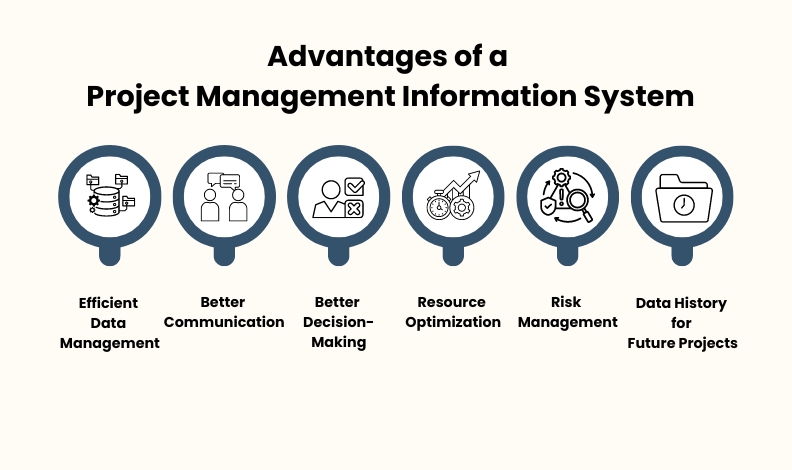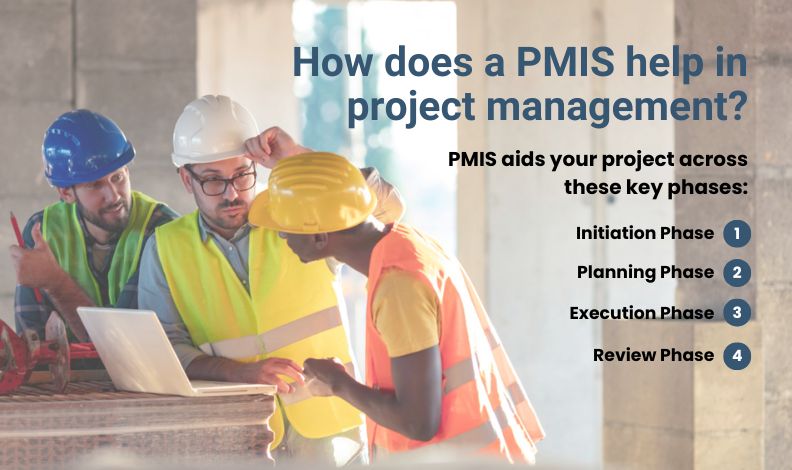Managing complex projects requires tools that streamline processes, improve collaboration, and ensure efficient data management. A Project Management Information System (PMIS) does exactly that. A Project Management Information System (PMIS) serves as a central hub that enhances planning, execution, and tracking throughout all project phases.
This blog explores what a PMIS is, its key advantages, and how project owners can leverage it to overcome challenges and drive success.
What is a Project Management Information System (PMIS)?
A Project Management Information System (PMIS) is a comprehensive software application that facilitates data management and accuracy throughout the project lifecycle. It serves as a centralized platform equipped with tools for:
- Data storage & management
- Task scheduling & resource allocation
- Real-time progress tracking
- Collaboration & communication
- Risk mitigation & reporting
A well-implemented PMIS empowers project teams with real-time access to project insights, ensuring better efficiency, transparency, and goal alignment.
PMIS acts as a backbone for the entire capital project ecosystem. It plays a vital role from project initiation to completion. It offers a versatile platform for handling information and data storage in various formats. Additionally, it facilitates team member and stakeholder communication management and extracting valuable business insights upon successful project execution. Project owners utilize PMIS to strategize and oversee different phases of a capital project. It ensures timely delivery without compromising data integrity.
Advantages of a Project Management Information System

Project Management Information System has many advantages, and its robust features play a vital role in increasing the efficiency of any project. Here are the advantages of a Project Management Information System:
1. Efficient Data Management
PMIS centralized project data, which makes it easier to store, access, and update information at a single location. This eliminates the need for disparate spreadsheets and documents.
2. Better Communication
It enhances communication between project team members and stakeholders. It allows sharing of project updates, schedules, and documents in real life, promoting collaboration and reducing miscommunication.
3. Better Decision-Making
PMIS provides project owners with easy access to up-to-date project data. This helps them make informed decisions quickly. Consequently, it enhances problem-solving and planning and makes the overall process more efficient.
4. Resource Optimization
PMIS enhances resource optimization by centralizing resource allocation, tracking, and management. It enables efficient scheduling, real-time adjustments, and proactive decision-making, ensuring optimal use of resources and improved project performance.
5. Risk Management
PMIS enhances risk management by centralizing risk identification and analysis, enabling real-time monitoring, and supporting proactive responses. This streamlines decision-making and helps mitigate potential issues, ensuring better project outcomes.
6. Data History for Future Projects
PMIS saves project data, resulting in a valuable archive of historical information. This information can be used for benchmarking, learning, and improving future project outcomes.
How does a PMIS help in project management?
Each modern PMIS (Project Management Information System) offers flexibility, allowing it to be customized to meet your organization’s specific project management needs, framework, and reporting procedures. When expertly tailored by technological professionals, a PMIS enables project managers to address requirements at every stage of a project’s lifecycle.

Incorporating PMIS can provide crucial assistance to your project throughout these crucial stages:
Initiation Phase
This phase involves defining project objectives, creating a preliminary budget, estimating costs, and preparing bids. Tasks are scheduled and assigned to appropriate teams, and a tracking system is established for reporting purposes.
Planning Phase
In this stage, critical path analysis and scheduling are conducted, project controls and key performance indicator (KPI) data are collected, resources are planned, and contingency plans are defined. The project’s baseline and success criteria are also established.
Execution Phase
During this phase, the focus is on monitoring and storing essential project-related information and files to ensure easy access. This data is compared with initial project estimates to make necessary adjustments to costs, budgets, and schedules as project requirements evolve. Performance metrics are used to guide the project towards successful completion.ics.
Review Phase
A comprehensive analysis is conducted to determine whether the project objectives have been met. A centralized repository is established for all project-related data to facilitate access and review. Historical data archives are created for future reference, and final project reports are generated for key stakeholders.
Related Read:
10 Best Construction Project Management Software For 2025
The Importance of Data Analytics in PMIS: A Comprehensive Overview
Transforming Construction Projects with PMIS Integration and Automation
Why is PMIS more Popular in the Construction Industry Now?
Challenges in implementing PMIS
Though implementing a PMIS is a highly beneficial endeavor, it comes with its own set of challenges. Some of them are:
1. Integrity Complexity – One major challenge is the integration of PMIS with an organization’s existing systems and tools. Data migration and compatibility issues can be time-consuming and resource-intensive.
2. Change-Resistant – Team members and project stakeholders may be resistant to adopting advanced technology and processes, which may result in a learning curve and reluctance to fully engage with the PMIS.
3. Data Accuracy – Making sure that the data entered into the PMIS is accurate and consistently maintained is a challenge. Failing to do so can lead to poor decision-making and project setbacks.
4. Cost and Budgeting – Implementation and maintenance of PMIS software can be a significant investment in terms of license issuing, training, and ongoing support. Budget constraints can be an obstacle in securing these resources.
5. Customization needs – Different organizations might have different management requirements. Aligning PMIS customization with specific workflows and processes can be complex and may require technical expertise. OnIndus has a team of experts who can help you with PMIS customization to provide you with a unified system that works particularly as per your organization’s requirements.
How to Choose the Right PMIS for Your Organization
Every organization faces data management challenges due to an overwhelming influx of project information. Without a structured PMIS, data inconsistencies can lead to mismanagement.
To find the right PMIS solution, project managers should consider:
- Scalability & Flexibility – Can it adapt to changing project needs?
- Integration Capabilities – Does it work with existing tools?
- Reporting & Analytics – Does it offer data-driven insights?
- User Experience & Support – Is it intuitive and backed by strong customer support?
Did you know? Only 35% of project managers are satisfied with their current PMIS. The remaining 65% seek better solutions to enhance project tracking and resource management.
Surprisingly, 35% of managers still rely on Excel for project planning, despite its limitations in handling complex, large-scale projects.
Do you need a PMIS for your project?

Capital program data is one of the most valuable assets for any project owner. That’s why project data needs to be processed, managed, and stored effectively. A project management team that values data and has set up a logical framework to carefully assess it, can derive valuable business intelligence to make the right business decisions.
You need an effective PMIS that can adapt to the changing requirements of your project in each phase. According to Finances Online, 11.4% of a company’s investments are wasted due to poor project management. That is why diverse teams managing complex capital projects should look at devising PMIS strategies to reduce information spill over at every phase of the project.
The PMIS software becomes the most trusted companion for a project manager. Whether it is ensuring transparent project communication or whether it is tracking project health and comparing it with the defined schedule and budget, the project manager can streamline all data streams into the PMIS and optimize efficiencies right from the planning phase. Maybe that’s why it’s no surprise that an organization with effective project management strategies wastes 28 times less money than others.
Conclusion
A Project Management Information System is more than just a tool for organizations. It is the cornerstone for successful capital projects. It improves accuracy, streamlines project data administration, and promotes efficient communication from inception to completion. For organizations, investing in a versatile PMIS is no longer an option but a necessity as it avoids information overload, cuts down on resource waste, and enables data-driven decision-making.
Furthermore, it is equally important to keep in mind that different organizations have different requirements. As a result, a customized PMIS is required to adapt to specific workflows and processes that require technical expertise. The expert team at OnIndus can help you get your customized PMIS tailored to your organization’s needs and also provides PMIS training. Do not settle for a one-size-fits-all approach when you can have a PMIS that perfectly fits your approach.
FAQs
1. What is PMIS?
A Project Management Information System (PMIS) is a digital platform designed to assist in planning, managing, monitoring, and controlling capital projects. It fully delivers project data to a single platform and effectively communicates and automates workflow. It also adds the capability to overlook the cost expenditure, schedule, and resource management.
2. What are the Types of PMIS?
PMIS encompasses management and is categorized into different types based on project requirements: Document Management Systems (DMS), Scheduling & Planning Tools, Cost & Budget Management Systems, Collaboration & Workflow Automation Platforms, and Risk & Compliance Management Systems. Each type is crucial in streamlining project execution, ensuring efficiency, and improving overall management.
3. Which PMIS Examples Are Best for Construction Projects?
The most effective PMIS solutions for capital projects include Trimble e-Builder, Procore, Oracle, and Kahua. These platforms help streamline project management, enhance collaboration, and improve efficiency. For detailed insights into PMIS tools and their key features, check out our comprehensive blog: Key PMIS Examples and Their Features
4. What Does a PMIS Specialist Do?
OnIndus, as a PMIS Specialist, assists capital project owners in selecting the right PMIS for their projects. The role includes implementation, data integration, workflow optimization, training, ongoing support, and post-implementation enhancements to ensure seamless project management and efficiency.
5. What is the difference between PMS and PMIS?
A Project Management System (PMS) is a broad framework that includes methodologies, processes, and tools used to manage a project effectively. It provides guidelines and best practices for project execution. A Project Management Information System (PMIS) is a specific digital tool or software that supports PMS by integrating data, automating workflows, and enhancing communication for better project tracking and decision-making.


